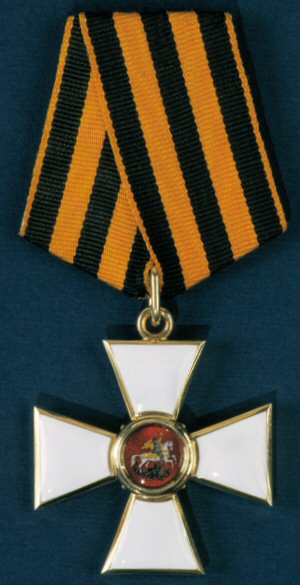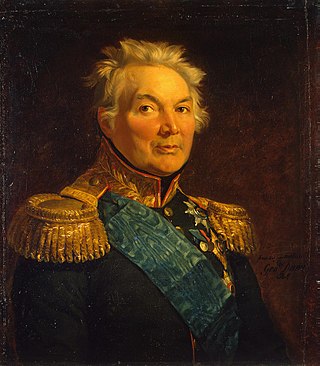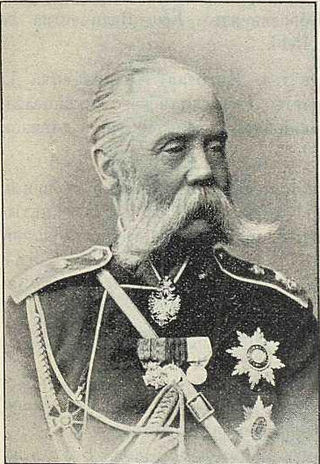See also
- Tolly Lights , a 2008 Indian film
- Tolly Cobbold, a former English brewing company
Tolly is both a given name and a surname. Notable people with the name include:

Prince Pyotr Ivanovich Bagration was a Russian general and prince of Georgian origin, prominent during the French Revolutionary and Napoleonic Wars.

Prince Michael Andreas Barclay de Tolly was a Russian field marshal who figured prominently in the Napoleonic Wars.

The Order of Saint George is the highest military decoration of the Russian Federation. It was originally established on 26 November 1769 Julian as the highest military decoration of the Russian Empire for commissioned officers and generals by Empress Catherine the Great. After the October Revolution in 1917, it was awarded by the White movement under Alexander Kolchak until their collapse in 1921. The order was revived in the Russian Federation on 20 March 1992 by Decree No.1463 of the President of Russia. The current award criteria were amended on 7 September 2010 by Presidential Decree 1099.

The Battle of Smolensk was the first major battle of the French invasion of Russia. It took place on 16–18 August 1812 and involved about 45,000 men of the Grande Armée under Emperor Napoleon I against about 30,000 Russian troops under General Barclay de Tolly. Napoleon occupied Smolensk by driving out Prince Pyotr Bagration's Second Army. The French artillery bombardment burned the city to the ground. Of 2,250 buildings, 84% were destroyed with only 350 surviving intact. Of the city's 15,000 inhabitants, about 1,000 were left at the end of the battle inside the smoking ruins. With over 15,000 casualties, it was one of the bloodiest battles of the invasion.

Clan Barclay is a Scottish clan of the Scottish Lowlands.

Fabian Gottlieb Fürst von der Osten-Sacken was a Baltic German field marshal in the Imperial Russian Army who led the army against the Duchy of Warsaw and later governed Paris during the city's brief occupation by the anti-French coalition.
Boris Ivanovich Orlovsky was a Russian Neoclassical sculptor.
Tolly Cobbold is a former brewery in Suffolk, England.
John Cavendish Cobbold nicknamed "Johnny," was an English businessman and a grandson of Victor Cavendish, 9th Duke of Devonshire. He chaired Ipswich Town F.C. from 1957 to 1976.
Barclay is a Scottish surname. Notable people with the surname include:

Raroia, or Raro-nuku, is an atoll of the Tuamotus chain in French Polynesia, located 740 km northeast of Tahiti and 6 km southwest of Takume. Administratively it is a part of the commune of Makemo.
Cobbold is a surname. Notable people with the surname include:
Berkeley most often refers to:
Michael Barclay may refer to:
Linwood is both a surname and a given name. Notable people with the name include:

Prince Alexander Magnus Friedrich Barclay de Tolly-Weymarn, born as Alexander Magnus Friedrich von Weymarn, was a Baltic German military commander who served in the Imperial Russian Army.

The Barclays de Tolly are a Baltic German noble family. They descend from Peter Barclay, a merchant from Banff in Scotland who emigrated to Rostock in 1621. Barclay was himself descended from the barons of Towie or Tollie in Aberdeenshire. His son, Johann Stephan Barclay, settled in Riga and became the ancestor of the Livonian branch of the family.

The Special Chancellery was a unit of Russian foreign intelligence in the beginning of the 19th century, serving the reign of Alexander I of Russia during the Napoleonic wars. The Special Chancellery participated in the two years prior to and during the French Invasion of Russia in 1812. The Special Chancellery operated under the Minister of War. The Minister of War at the time, Michael Andreas Barclay de Tolly, created the Special Chancellery in 1812. The Special Chancellery’s mission was to gather intelligence on the political activity, military activity, and economy of European states that were a potential enemy of Russia, particularly France. Its operations focused on strategic intelligence, operational and tactical intelligence, and counterintelligence. The Special Chancellery is known to be the birth of counterespionage in Russia.

The Council at Fili was a military council, which was convened on 13 September 1812 after the Battle of Borodino during the French invasion of Russia by Commander-in-Chief Mikhail Kutuzov in the village of Fili, west of Moscow. The question was asked whether, after the orderly retreat from the Battle of Borodino that Napoleon had won despite great losses of the Grand Armee, to give another battle near Moscow or to abandon the city without a fight.

The crossing the Gulf of Bothnia, specifically Kvarken, was a march of Russians through Kvarken, Gulf of Bothnia, to the territory of Sweden at Umeå. It was during the Finnish War in March 1809.